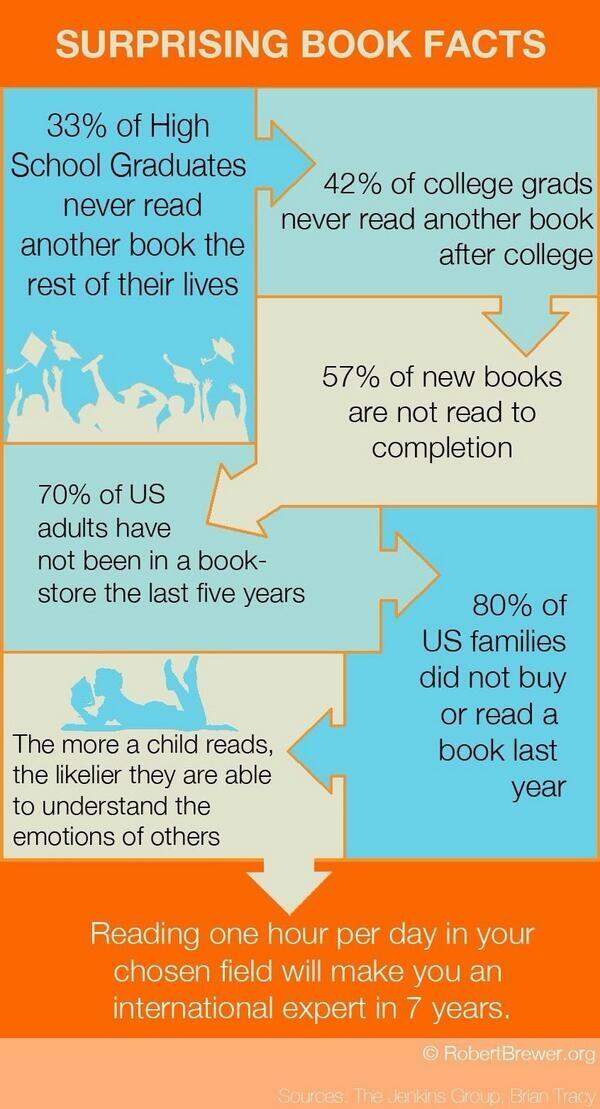33% of High School Graduates never read another book the rest of their lives. 42% of college grads never read another book after college. 57% off new books are not readd to completion. 70% of US adults have not been in a book store the last five years. 80% of US families did not buy or read aa book last year. Reading one hour per day in your chosen field will make you an international expert in 7 years.
Translate
Showing posts with label character. Show all posts
Showing posts with label character. Show all posts
Monday, August 19, 2013
Urgent: Our Children Must Learn to Love to Read.
Twitter / advice: Books. http://t.co/haIQUAwfyz
Saturday, July 20, 2013
Book: Honoring My Father: Coming to Terms
Honoring My Father: Coming to Terms
 Do you have someone you cared deeply about that is no longer with you? Do you wish that you could go back and do a better job of letting them know how much they meant to you? Yes, we all do. In this heartfelt account, David Satterlee tells personal stories of a remarkable father, his own failure in family and faith… and the rediscovery of love worth living for.
Do you have someone you cared deeply about that is no longer with you? Do you wish that you could go back and do a better job of letting them know how much they meant to you? Yes, we all do. In this heartfelt account, David Satterlee tells personal stories of a remarkable father, his own failure in family and faith… and the rediscovery of love worth living for."Honoring My Father" is a journey of growth across generations. David remembers his Father's life with affection, and describes his own depression, spiritual crisis and divorce that led to being shunned by his family. Remarried, David and his wife attend his Dad's memorial service and discover opportunities to honor his Father's life, character, and a final wish.
This books also includes "Going to See Jessie," a related family story of elder-care, love, loyalty, and enduring patience. "Providing home care develops a predictable and cadenced routine... Going to see Jessie was an integral part of our Sisyphean life together. It was more than a routine; it was an obligatory rite, a necessary commemoration, like giving thanks before a meal or putting flowers on a grave."
Buy paperback or Kindle eBook at Amazon
Buy paperback or ebook at Barnes and Noble
Buy multiple eBook formats at Smashword
Tuesday, July 2, 2013
Essay: Stages of moral development – Lawrence Kohlberg
Information and comments on the essay:
Stages of moral development – Lawrence Kohlberg
 From the book: Chum for Thought: Throwing Ideas into Dangerous Waters by David Satterlee
From the book: Chum for Thought: Throwing Ideas into Dangerous Waters by David Satterlee
Find out more, including where to buy books and ebooksRead or download this essay as a PDF file at: https://docs.google.com/file/d/0B4eNv8KtePyKMGRBOWVKOFdEaXM/edit?usp=sharing
How #morality grows in stages – Lawrence #Kohlberg #Moral #Development
Read by the author:
 |
| Chum For Thought: Throwing Ideas into Dangerous Waters |
Stages of moral development – Lawrence Kohlberg
Last week, I discussed the research of James W. Fowler, a Methodist minister, into the developmental stages of faith. Dr. Fowler built his ideas on the pattern of Lawrence Kohlberg’s stages of moral development. This is also worth considering.
Dr. Kohlberg found that moral development was revealed by one’s attitudes toward justice and how one reasoned on, and resolved, moral dilemmas. Related research identified justice as a masculine orientation and added caring as the corresponding feminine. At each stage of development, our moral behavior becomes more responsible, nuanced, and predictable.
Young children (and some poorly-developed adults) judge the morality of an action by its immediate consequences. Snatching a cookie or running a stop sign are just fine so long as you are not caught and punished. The focus is on personal benefit without considering ethical standards. Obedience can only be enforced with the threat of punishment.
The next stage is able to consider the needs of others, but only to the point of how to get what one wants. This is the “you scratch my back, and I’ll scratch yours” attitude of moral relativity.
Adolescents usually begin to judge the morality of a situation according to the expectations of authorities within their culture. They are willing to comply obediently because they are convinced that “it is the right thing.” This rigid morality typically views things very strictly in terms of “black and white.” A “good boy” or “good girl” conforms to accepted social roles. Morality is usually judged by intent and how an action affects relationships.
Some people understand that social order requires voluntary compliance to the standards of their community. They accept that laws must be obeyed and personal sacrifices made because it is their duty. They will stop at all stop signs simply because it is the right thing to do and because it sets a good example for others.
As it becomes obvious that different cultures hold different expectations, laws become regarded as adjustable social contracts within each community. The most important consideration becomes an understanding of “the greatest good for the greatest number of people.” The operation of an effective Democracy requires this understanding and acceptance of compromise as inevitable for the common good.
Eventually, moral reasoning stops being derived from others; it depends on an individual appreciation for ethical abstractions and universal principles. This is not the same as moral relativity. Each person becomes responsible for deciding that he or she cannot march neighbors into gas chambers, no matter what. If a law is unjust, there is an obligation to disobey it. There are fewer arguments about rights, but more empathetic consideration of what is right. This stage is still considered rare.
Subscribe to:
Posts (Atom)
